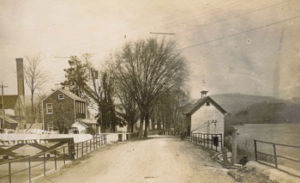Zinc, iron, steel. . . the Lehigh Valley was once a world industrial powerhouse. Find out how and why this came to be! Explore these partners:
Alburtis Lock-Ridge Historical Society
Alburtis Lock-Ridge Historical Society preserves the heritage of the towns of Alburtis, Lock Ridge, and surrounding areas that were once centers of industry and home to the Thomas Iron Company, Lock Ridge Furnace, key iron ore mines, and a local railroad hub.
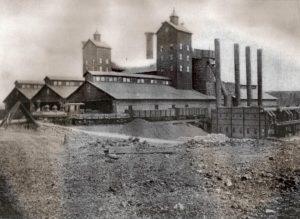
Boyertown Museum of Historic Vehicles
A museum of road transportation, vehicles, artifacts, roadside culture, alternative propulsion, and vehicle builders focused on Pennsylvania and the Greater Delaware Valley; as well as the historic vehicles built by Jeremiah Sweinhart’s Carriage Factory 1872-1914 and by Paul Hafer’s Boyertown Auto Body Works 1914-1990 in the historic Industrial Age factory buildings which now house the collection.
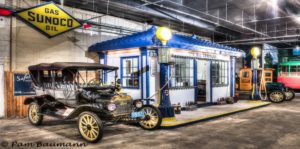
Durham Historical Society
Durham’s Village Center features a large gristmill (circa 1820) which has remained unchanged except for an add-on section since it was built. Much of the original gristmill machinery remains intact inside the timber framed structure. The mill, a registered historic property, ceased operation in 1967, and is now owned by the Township.
Hellertown Historical Society
Learn about the inordinate supply of brown hematite iron ore and limestone in Lower Saucon which supplied the Saucon and Thomas Iron companies with needed resources between 1866 and 1920.
Historic Bethlehem Museums & Sites
The Colonial Industrial Quarter was a hub of activity that supported the Moravian community, at one time hosting 35 trades. The Waterworks was the first municipally pumped water system in colonial America. The Tannery may be the oldest Moravian industrial building in the world.
![]()
![]()

Jacobsburg Historical Society
Jacobsburg and Boulton were early centers of industrial production in the late eighteenth- and early nineteenth century. William Henry II (1757-1821) established his first gunworks on the Bushkill Creek at Jacobsburg in 1798 to complete a government contract; he later converted this factory into a grist mill and sawmill. In 1812, his two sons, J. Joseph Henry (1786-1836) and William Henry III (1794-1878), built a much larger factory about a mile away on the Bushkill. This factory, called Boulton, produced arms for nearly a century.
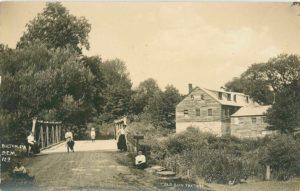
Lower Macungie Township Historical Society
In the mid-nineteenth century the Lehigh Valley became one of Pennsylvania’s leading producers of merchant pig iron. Most of the farmers in Lower Macungie took advantage of the need for iron ore. At least 16 LMT mines were opened before 1859, and that number eventually climbed to more than 76, almost one-third of all the mines in Lehigh County. On the neat, hundred-acre farms that had been the sustenance of the population for so long, ore pits began to appear, and washeries were built to clean the limonite ore of its clay.
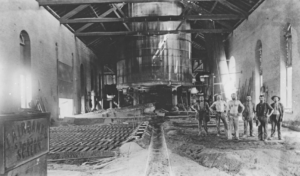
National Canal Museum and D&L National Heritage Corridor
Visit the National Canal Museum to explore how the region’s canals transported anthracite coal and other goods, sparking America’s industrial revolution. In addition to exhibits on canals, the museum contains artifacts from related industries such as railroads, coal mining, and iron production. The museum is located in Easton’s Hugh Moore Park, which also features an outdoor industrial heritage trail and remnants of the Glendon Iron Works.

National Museum of Industrial History
Housed in the former Electric Repair Shop of the Bethlehem Steel plant site on the vibrant SteelStacks arts & culture campus, the National Museum of Industrial History interprets industry past, present and future through dynamic exhibits, hands-on interactives and engaging programs. Visitors of all ages can enjoy the stories of the people, machines and ideas that transformed our nation through a rich collection of rare artifacts including the esteemed 1876 Smithsonian Industrial collection.
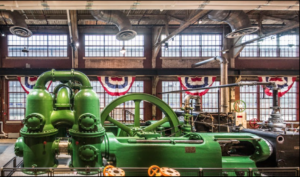
Northampton County Historical and Genealogical Society/Sigal Museum
The Northampton County Historical and Genealogical Society’s Sigal Museum features an exhibition which focuses on role of industry in the County, an area rich in natural resources and skilled laborers. Vist the museum to discover how rivers provided power to turn waterwheels and move canal boats, quarries provided slate, stone, and limestone to build, textile mills provided materials for clothes and household goods, rolling mills created rails for rail roads, foundries created iron and steel used to create America, and much more!
No. 9 Coal Mine and Museum
The No. 9 Coal Mine and Museum in Lansford is the oldest coal mine you can tour in the United States as well as being the oldest continuously operated deep Anthracite coal mine in the world. Visitors experience a 1600′ ride into the mine followed by a one-hour guided walking tour that illustrates the hard work and determination that was required to fuel the Industrial Revolution. Visitors get to see the mine’s original 700′ deep shaft, a miner’s hospital, and walk the mule-way. On the surface is a mining museum housed in the No. 9 Coal Mine’s original Wash Shanty.
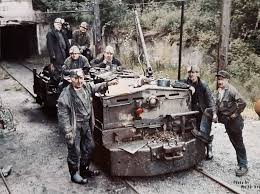
Schwenkfelder Library & Heritage Center
In the Kriebel Rural Entrepreneurship Gallery at the Schwenkfelder Library & Heritage Center, discover the industries that supported or were started on farms. Starting with the first industries of iron and milling, the exhibit showcases local companies who made farm equipment for the international market, ice harvesting, pottery, and even production of musical instruments.
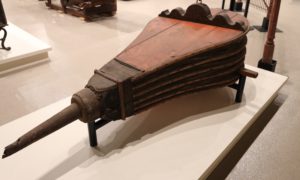
Slate Belt Heritage Center
Explore the slate industry that produced the country’s blackboards and roofing shingles. See how slate quarries and textile factories changed rural life.
Whitehall Historical Preservation Society
Whitehall Township played an important part in the Industrial Revolution with the development of many prominent business establishments such as the Thomas Iron Works in Hokendauqua, Giant Portland Cement in Egypt, and Dent Hardware in Fullerton, just to name a few. Learn about these and other Industries in the Whitehall area.
Williams Township
Explore Uhlersville, a vanished village, and take the Virtual Driving Tour: Early Industries of Williams Township. Uhlersville was a once-bustling town of two hundred people that vanished with the closure of the canal. The town was situated along Locks 22 and 23, collectively known as the “Groundhog Lock,” and thrived on the timber and limestone industries.
